
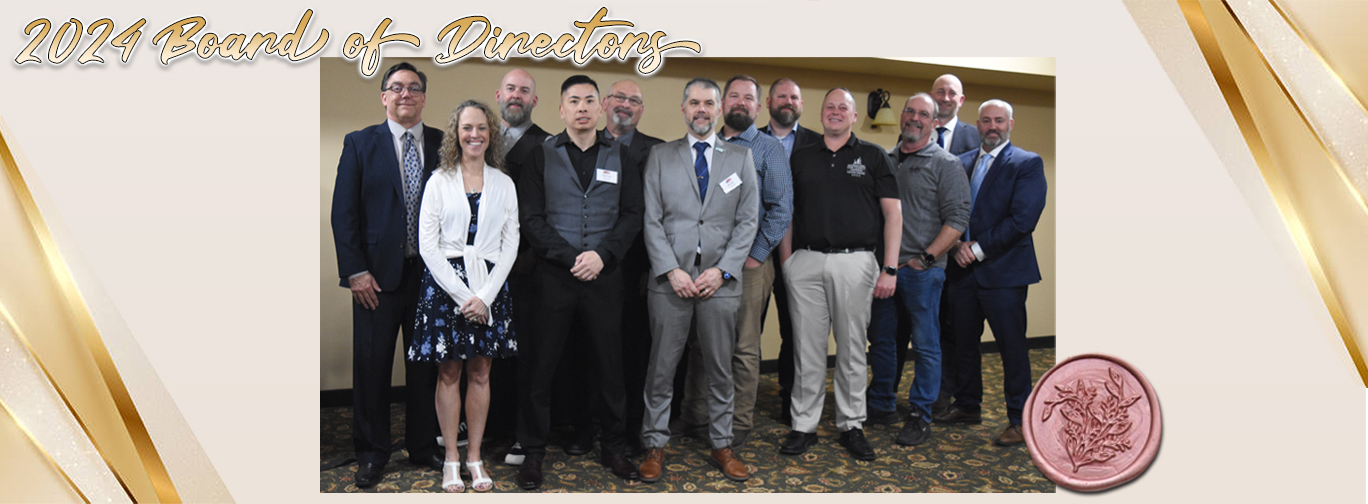
ICC Vice President, David Spencer, swears in the 2024/2025 Board of Directors
WABO PRESIDENT’S REPORT - by Ray Cockerham, CBO
I'm grateful to all of you who attended the 2024 annual business meeting of the Washington Association of Building Officials (WABO) in Leavenworth. It was our first spring annual business meeting, and we had a great turnout. This is an exciting time for our organization. I'm honored and delighted to serve as president. I appreciate the chance to lead this organization on behalf of the members. We had an exciting election with a close race for second vice president between two very qualified candidates. Congratulations to Angela Haupt for becoming the new second vice president of WABO and joining Todd Blevins and me as executive officers.
We have two new board members. Quyen Thai from City of Tacoma has been elected as the chair of the Emergency Management committee. Andie Lorenz from Adams County has been elected as the Finance Committee chair and Ryan Muma, City of Bellevue has moved to a new role as the Education Committee chair.
I'm eager to work with the board and the executive officers for the next year. I've been working on developing a platform of issues to address. Some are underway, some are just starting, and I'm sure some will emerge later. All our committees are equally important. I see and value the work of those who work hard to move our organization forward. I like to say that “this is what WABO is and this is what WABO does”. As we celebrate this new year, let's remember our identity and purpose. WABO is a community of dedicated professionals committed to ensuring building and life safety. We do this by promoting excellence in building codes, providing education and training, and fostering collaboration among building officials across Washington. I'm always impressed by how our members step up, take on responsibilities, share burdens, and work towards public safety.
As we look ahead to the ICC annual meeting in Long Beach, we can support our fellow chapter member who is ready, qualified, and deserving of the opportunity to lead ICC. Our support for David Spencer will also create more opportunities for WABO at the national level.
As we start the year, I would like to adopt a motto: “Back to Basics and Beyond”. As we are committed to strengthening our foundation while also pushing the boundaries of what we can achieve. I hope to stay connected to our roots, reinforce our basic principles, and then go beyond to explore new opportunities and challenges. I want this motto to reflect some of the things that we value, such as pursuing liaison efforts and making sure our network of connections is informed, collaborative, and strengthened by our association. Our financial security on behalf of our members must be something we think about, work on, and address as we look at the needs of the organization and the program desires. I'm hopeful and encouraged by some of our recent committee work.
The Outreach Committee led by Stacy Criswell inspired the largest number of first-timers I've seen at a meeting in a long time. Their collective engagement is encouraging and needed to ensure that our organization has the depth and breadth to take on the challenges ahead. “This is what WABO is, this is what WABO does”. The Certification and Registration Committee led by Brian Smith is a foundational committee of WABO with some key projects on the horizon. The work James Tumelson of Edgewood puts into leading the Accreditation Committee is a testament to the commitment WABO has made to its members with a foundation in education. Tim Woodard from City of Mount Vernon leads our legislative committee he has done a masterful job of navigating the difficult terrain of politics his efforts are commendable and there isn't a member of the organization that hasn't benefited from his leadership. The Technical code committee led by Micah Chappell City of Seattle is the rallying cry of the organization for the codes we use, interpret and create and incubated with the work of the TCD committee.
For the first timers, those over already participate in committees, and those who join us at the meetings I hope you have the sense that your commitment, your contribution and the return on your investment of time will always be worth your while alongside a fellow Wabonian.
With sincerity and gratitude,
Ray Cockerham
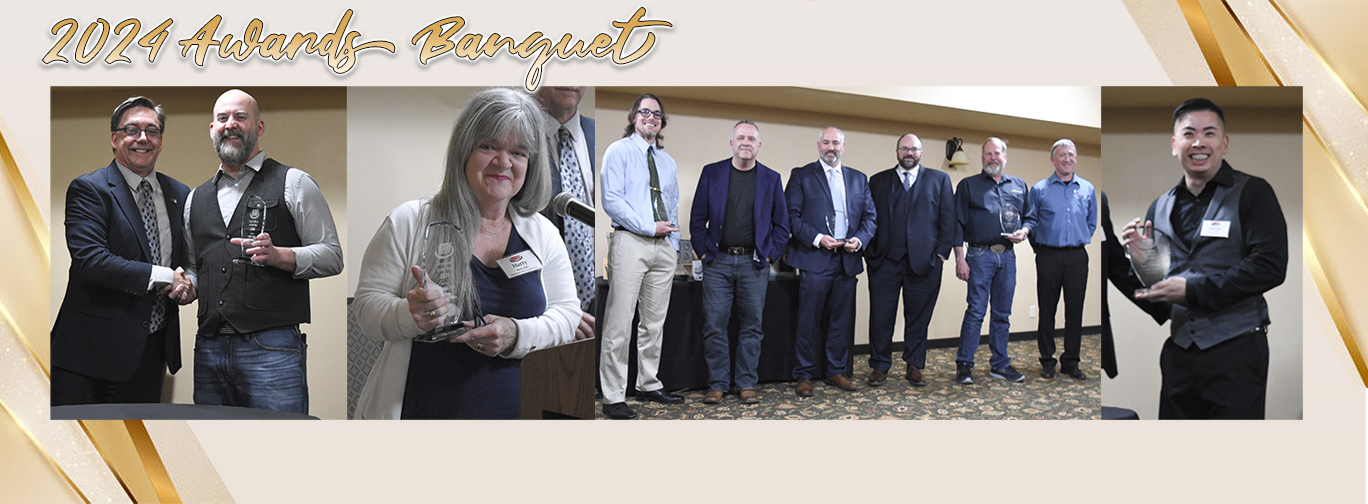
2024 Code Official of the Year: Ardel Jala, City of Seattle (Micah Chappell accepted on Ardel's behalf) 2024 Jurisdiction Outreach Award: City of Lake Stevens - Brett Gailey (Mayor) & Tyler Farmer; City of Stanwood - Shawn Smith (City Administrator) & Scott Black; City of Mount Vernon - Geoffrey Thomas (Mayor) & Stacy Criswell Lifetime WABO Honorary Member: Sue Coffman, City of Tacoma, Retired (Quyen Thai accepted on Sue's behalf) 2024 Outstanding Educational Achievement: Chris Jensen, UL Solutions (not present)
Technical Code Development Committee - Chair Micah Chappell, MBA, CBO
Technical Code Development Committee (TCD) discussed the ICC Committee Action Hearing (CAH) that was attended by several WABO TCD members. WABO TCD had a good success rate on proposals and had great participation with testimony. ICC will be having another Cah this fall in Long Beach, CA. Scholarships are available to attend the hearings.
TCD discussed the schedule provided by the SBCC for developing the 2024 WA State Codes and the upcoming TAG process. The SBCC recently voted to have the 2024 WA Codes be implemented Now/v. 1, 2026. It was announced that Angela Haupt is now the Code Official Representative on the SBCC.
TCD also provided updates from the TCD subcommittees on Egress and Fire Safety that worked on ICC code change proposals. Information was shared about the TCD workgroups that are working on Code change items that have been State legislative topics including Multiplex Structures (up to 6 dwelling units), and Single Exit buildings up to six stories.
Lastly, TCD discussed the proposed inspection checklist that is being developed to assist jurisdiction with the changes to Family Home Childcare. The changes include various code that will allow an increase of the allowable number of children.
Certification & Registration Committee - Chair Brian Smith, CBO, ACO
The Certification and Registration (C & R) Committee met twice this past quarter, once virtually before the Spring ABM and once in person at the ABM.
Special Inspection Lab Tours by jurisdiction staff, Special Inspection Agency Technical Directors, and the 3rd party WABO WSEC Energy Code Plans Examiner Certification were some of the highlighted topics discussed during both meetings.
There was support at the ABM from the membership to learn more about what Special Inspection Agency lab tours could look like, so the SIRP Board will continue those conversations.
Regarding the SI Technical Directors, previously under WABO Standard 1701 Technical Directors had to be located within a 50 mile radius from their home of record location, so they were available to be on a job site in a timely manner should an issue arise. It is important to understand that an agency Technical Director is a person with engineering managerial qualifications that’s responsible for providing direction and oversight to an agency.
After the pandemic concluded, the SIRP board voted to remove that 50-mile requirement now that virtual meetings have become more of a new normal in our industry. The question was asked to the SIRP Advisory Board & C & R Committee on what WABO expectations of the Technical Directors are at the agency.
A subcommittee of current SI Technical Directors and Building Officials will be formed to provide clarity in our 1701 standard.
Now that both the 2021 Residential and Commercial energy codes are official, we have a separate SIRP subcommittee that will be working on developing the 3rd Party WABO WSEC Plans Examiner Certification. Minimum qualifications, along with written and oral interview questions will be established for this certification category.
If you’re interested in learning more about the C & R Committee or participating in any of the above subcommittees, please reach out to myself or the WABO office.
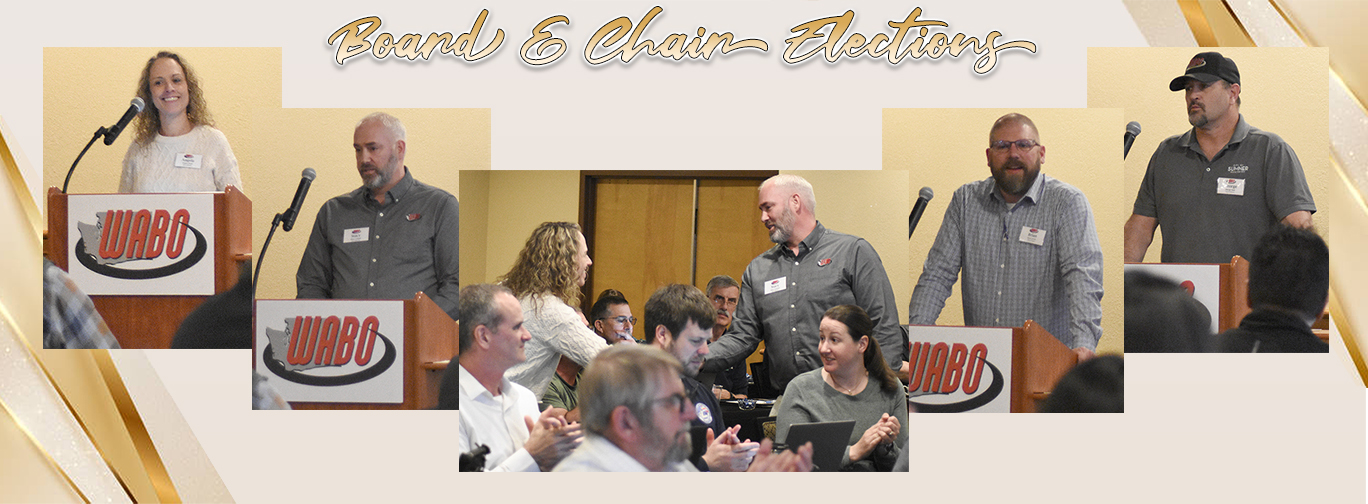
Government Relations - Chair Tim Woodard
The Government Relations Committee met to discuss this past year’s legislative session. WABO had a very active year that included bills such as the revised WUI bill and HB 2071 that requires a mechanism within the IRC to build up to a six plex. The discussion centered around the committee’s ability to work collaboratively with legislators to reinforce their role to set policy but to rely on technical experts to write the code to be enforceable.
The committee went on to discuss the proactive legislation WABO is considering for this next legislative session. The “big lift” this cycle will be to get into state code that the SBCC is responsible for producing the Washington Custom Codes. This year the decision was made by the SBCC Director for this to take place but without legislation this could change at any time. Anyone that is interested in joining the committee please e-mail Tara Jenkins [email protected] at the WABO office and she can get you established on the distribution list.
Finance Committee - Chair Andie Lorenz, CBO, ACO
Andy provided the membership with an overview of WABO's 2023/2024 3rd quarter financials.
Education Committee - Ryan Mumma, CBO, ACO
Stacy Criswell chaired the Education Committee meeting in the absence of Max Booth. The Committee went over the 2024 Annual Education Institute (AEI) reports which covered class comments, instructors, final numbers, and the beginning class projections for the 2025 Annual Education Institute. Many were positives and there were a few that we will continue to work on. The Education Committee reviews extensively the information that is extracted off of the survey results from the Annual Education Institute and thanks the individuals that provides constructive feedback that is helpful to make the event better each year. The 2025 AEI will still be held at the Lynnwood Event Center as many attempts to find a new locations were attempted and many facilities either could not hold our capacity, the Food & Beverage minimum was too high, or the room block request ask was higher than WABO can facilitate. Institute will be at the Lynnwood Event Center for 2025 and 2026. The Education Committee will begin selecting classes for the 2025 Annual Education Institute at the 2024 Summer meeting. If you are not aware, the committee enlists the help of volunteers to join and help put together the roster of classes that you see offered each year at Institute. So, if there was something you wanted to see but didn't, this is your opportunity to join the committee and help establish the trainings that matter to you. Please contact Ryan Mumma at [email protected] for more information.
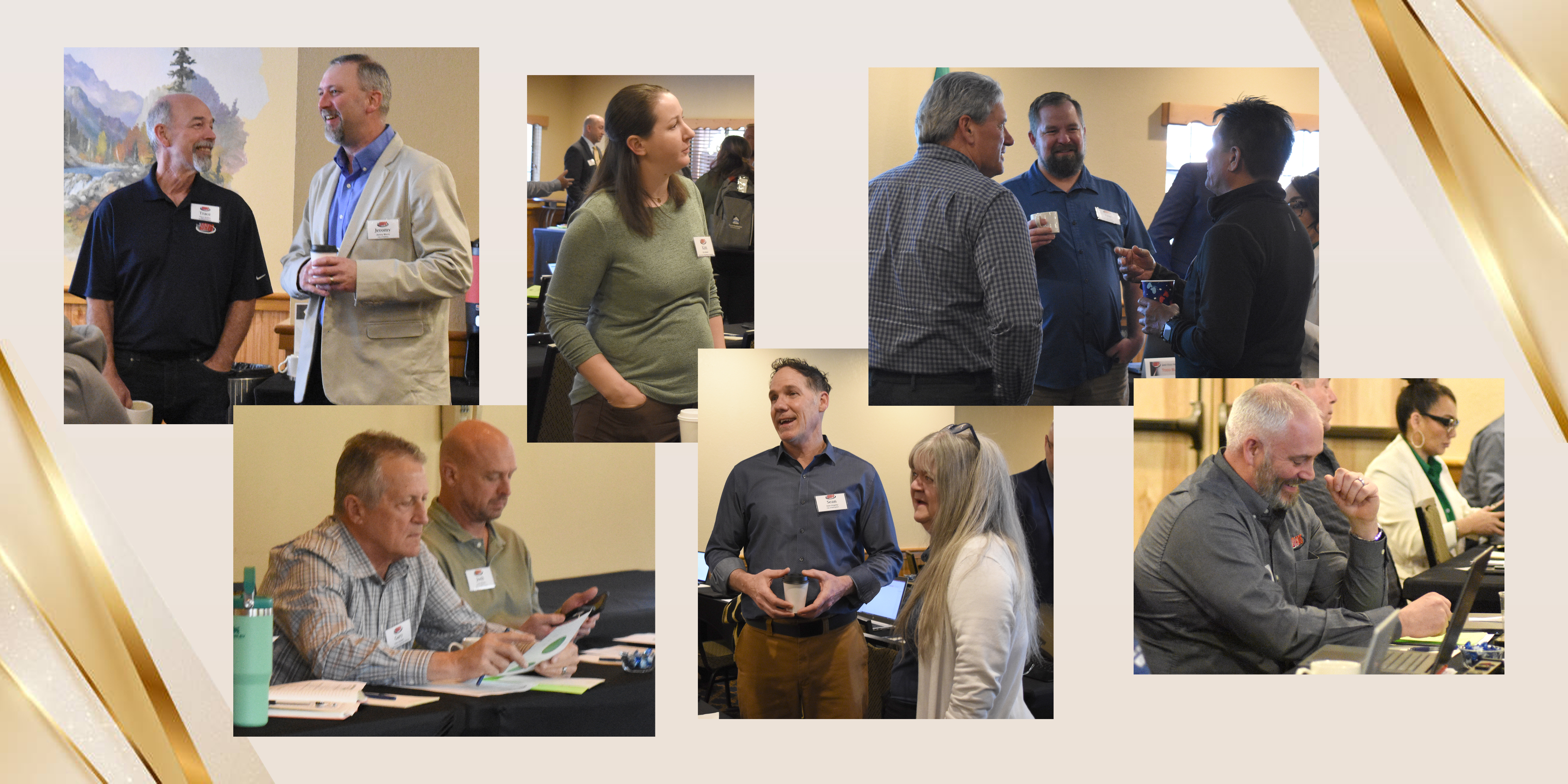
Outreach Committee - Chair Stacy Criswell, CBO, ACO
We continued the discussion about a dedicated WABO liaison position to help us be in communication with different organizations across our state . The goal is to be proactive in these organizations where we overlap so we have a voice at the table so to speak. Many times we have been caught of guard and in retrospect, both organizations have said, “I wish we would have collaborated before now”…
What we found is that many of the members at our annual business meeting are part of one of the 22 organizations we highlighted. So, as of now I will be the main point of contact to the board, so if you hear anything that WABO may want to be part of, or would give us a heads up about something that we need to watch, please reach out to me at [email protected] so we can get involved.
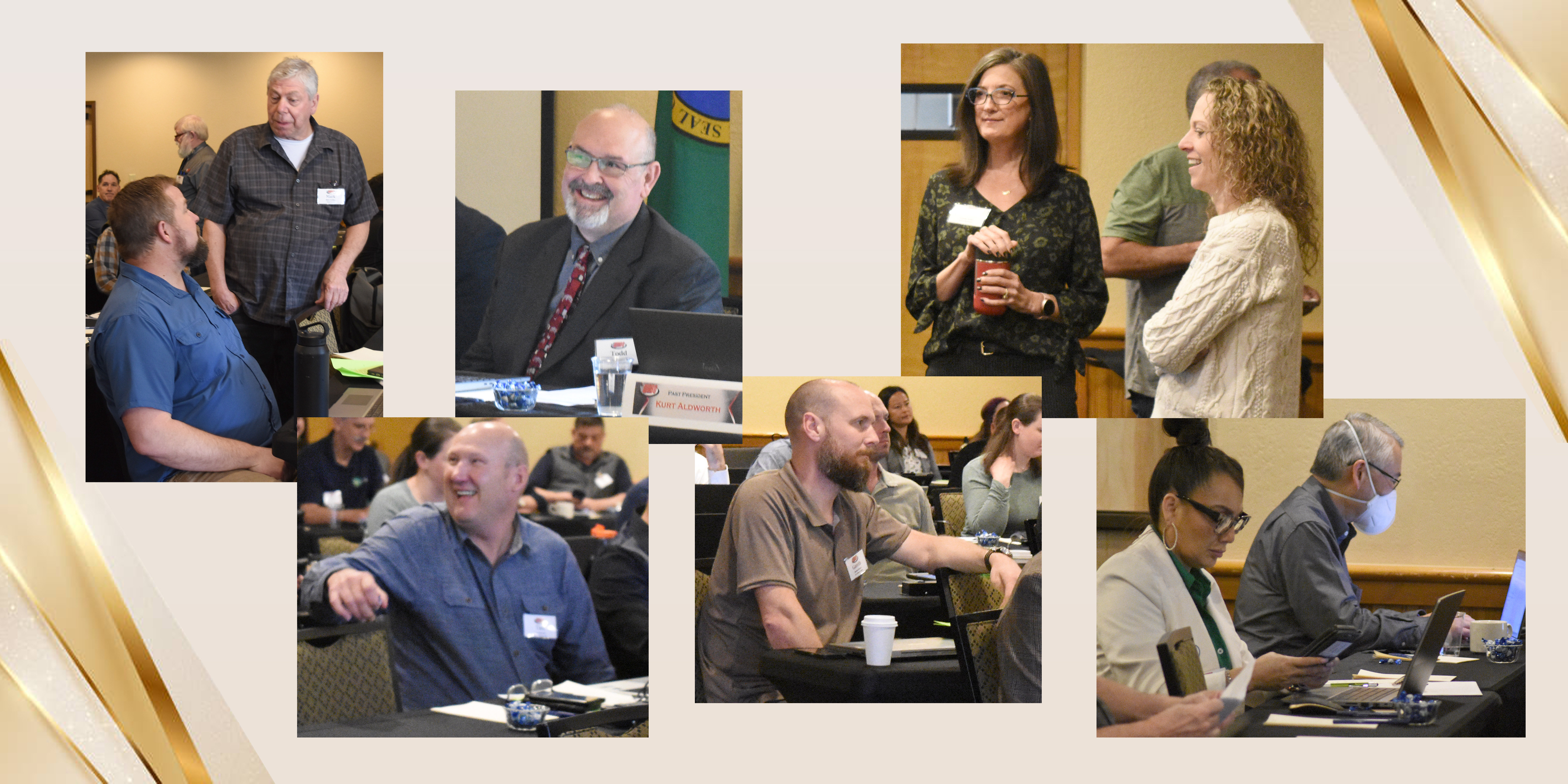
Emergency Management Committee - Chair Quyen Thai, CBO, MCP
At the Annual Business Meeting, Quyen Thai was elected as the new chair of the Emergency Management Committee, defeating Ryan Mumma in a landslide election. Brian Terbush, from the WA State Emergency Mgmt Group, gave a presentation on the first pilot program conducted by ‘non-technical’ volunteers in the State’s URM Workgroup to identify and inventory unreinforced masonry buildings through sidewalk surveys and add them to DAHP’s GIS Mapping database, called “WISAARD”. (Dept of Archeology and Historic Preservation - Washington Information System for Architectural & Archeological Records Data.) The City of Everett was used as the first location of the pilot program and the URM Workgroup is currently working with numerous stakeholders to gain additional resources and funding the expand the program to other areas across the state. The committee also spoke on the importance of strengthening the volunteer capacity of the WAsafe ATC-20/45 volunteer program by enlisting new volunteers and recertifying existing volunteers. The WABO Emergency Management Committee, in collaboration with WAsafe, is currently developing a survey to determine the interest of member jurisdictions to attend a potential training event in Central and Eastern Washington to certify volunteers as WAsafe Building Safety Evaluators, or BSE’s. The importance of maintaining a resilient and redundant resource of WAsafe BSE’s depends heavily on our partners in Eastern Washington. We know that the impact of events are generally regional and place immense strain on the impacted region. Having available resources who are outside the impacted area and more insulated from the event will strengthen our readiness, not only to respond to an event, but to provide support to those who need it. Meaning, it’s not only about having you available to support others if needed, it's about having others available to support YOU and YOUR community when YOU need it! So please keep an eye out for the upcoming WAsafe survey! And if you are not already registered as a BSE, please consider getting signed up and encouraging your coworkers to do so as well – wherever you are located in our beautiful state!
In the future, Quyen will discuss with his committee revamping the Emergency Management meetings to coincide right after the Washington State EMD which occur every other month. Quyen wants to start his term with two main goals:
- Get east-side jurisdictions involved as much as possible. The committee will be discussing various outreach efforts for more east-side involvement.
- Finish up the URM project that Ryan and the committee have started with the state. Brian Terbush from EMD has reached out, so a WABO Emergency Management Committee representative will now be attending their meetings.
a. Emergency Management Committee will work on getting the State EMD and Washington State to look into providing funding for URM
upgrades for owners/jurisdiction. Hopefully, get a grant program started. This is probably a year 2 or 3 outlook but it's on the Emergency
Management Committee’s radar.
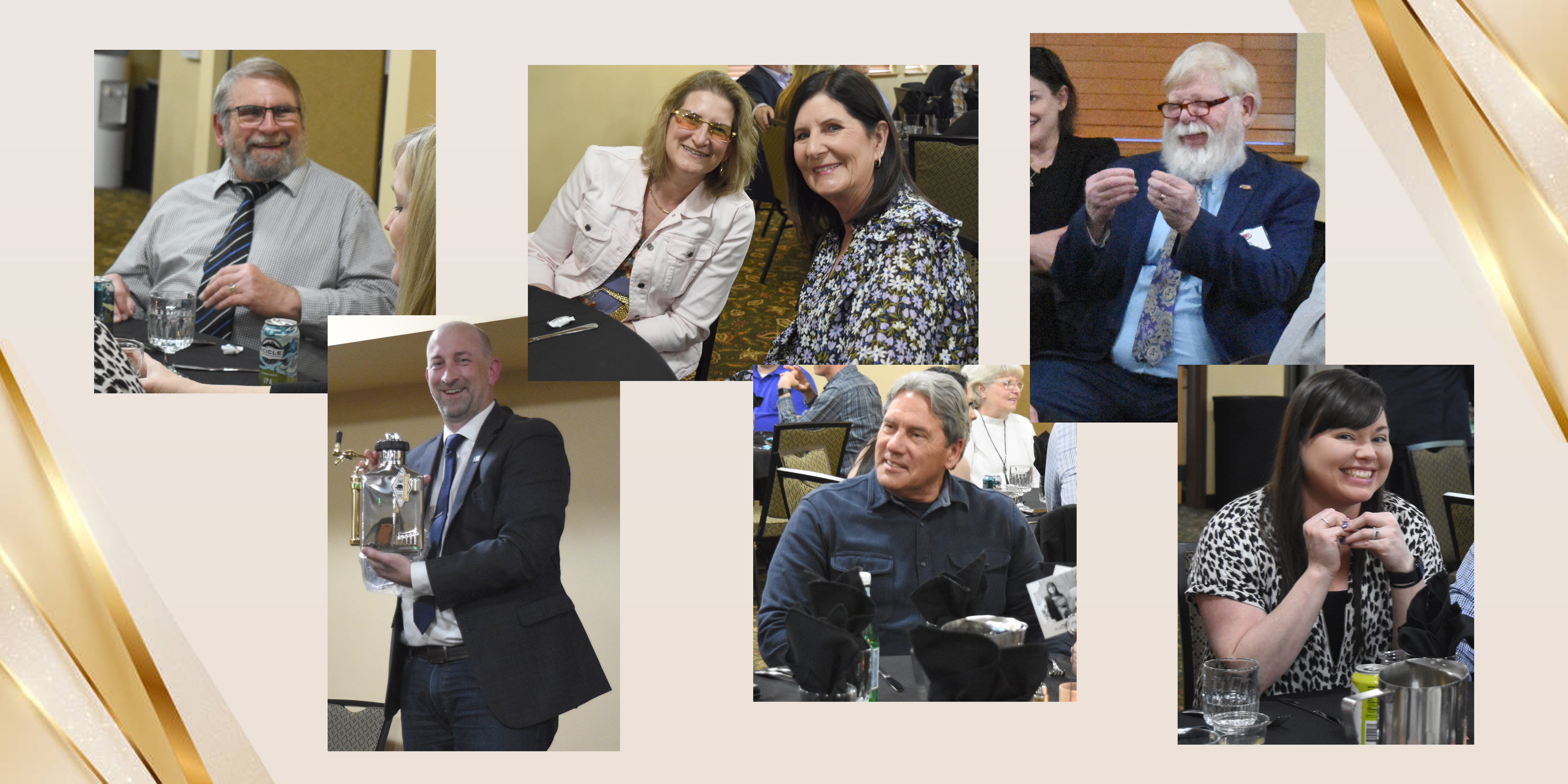
Quarterly Report to the WABO Membership, April 2024
Functional Recovery Provisions Update
Jon Siu, PE, SE, ACO
Since my last report in July 2023, the various Topic Subcommittees (TSs) of the Functional Recovery Task Committee (FRTC) have continued their work to develop the provisions that would govern design of buildings for Functional Recovery.
As a reminder, the concept of Functional Recovery is that it is a performance objective where a building is able to perform its “basic intended function” within a specified period of time. This is different from the life-safety objective that we are used to dealing with in the building code, where a building may be heavily damaged in an earthquake but the occupants are able to safely leave the building. In early April, the FRTC issued the first formal ballot on the provisions as they currently stand. Voting on this ballot closes near the end of this month. Some key features/concepts contained in
the provisions are:
• The provisions will only address Functional Recovery from earthquakes. Several commenters on a previous, informal ballot wanted the focus to be broader (i.e., include other hazards such as hurricanes, tornadoes, etc.) However, the scope of National Earthquake Hazard Reduction Program’s Provisions Update Committee (the parent committee for the FRTC) is only seismic, so expanding the provisions beyond earthquakes was deemed to be out of bounds.
• This ballot focuses on the technical provisions such as categorization and design provisions. Policy decisions as to whether design for Functional Recovery is mandatory, voluntary, or triggered by some other factor such as occupancy or size will be left to another body to decide. Candidates
for the policy decision would be the PUC, ASCE 7, or the IBC.
• The TS responsible for defining the hazard seems to be coalescing around the concept that the Functional Recovery provisions will be based on a smaller, more frequent earthquake than is used for life-safety design under the current code. This will result in smaller ground motions for
Functional Recovery design.
• The current proposal requires that buildings designed for Functional Recovery will need to comply with strict deflection limits. This will result in buildings that are stiffer than current code would allow, even with the reduced ground motions from the smaller earthquake. The concept is that damage to non-structural components is more likely to trigger building shut-down and repairs, which will affect whether the building meets the Functional Recovery goals. A stiffer building will likely result in less damage to non- structural components.
• Buildings will be categorized into one of five Functional Recovery Categories. These are similar to Risk Categories in the building code, but are focused on how the building supports community function. Buildings that house functions that are more important to the community will be expected to be functional in a shorter period of time than those that are less important, and will therefore need to be designed to more stringent standards. Work is still in progress on what functions are more important to the community than others, but some are fairly obvious—hospitals and emergency operations centers will need to be functional immediately after an event, and will be designed to the most stringent requirements. Some buildings such as agricultural buildings may not need to be functional for months as far as the community is concerned, and will have the least stringent (or no) requirements. It is envisioned that there will eventually be a way to map occupancies and uses in the building code to the Functional Recovery Categories.
In the future, once the design parameters are more settled, there will be a number of case studies conducted to test-drive the design provisions, and to estimate the difference in the cost of construction between current code design and a building designed for Functional Recovery.
There are still many opportunities for input on these provisions. If you have any questions or want more details, feel free to contact me.
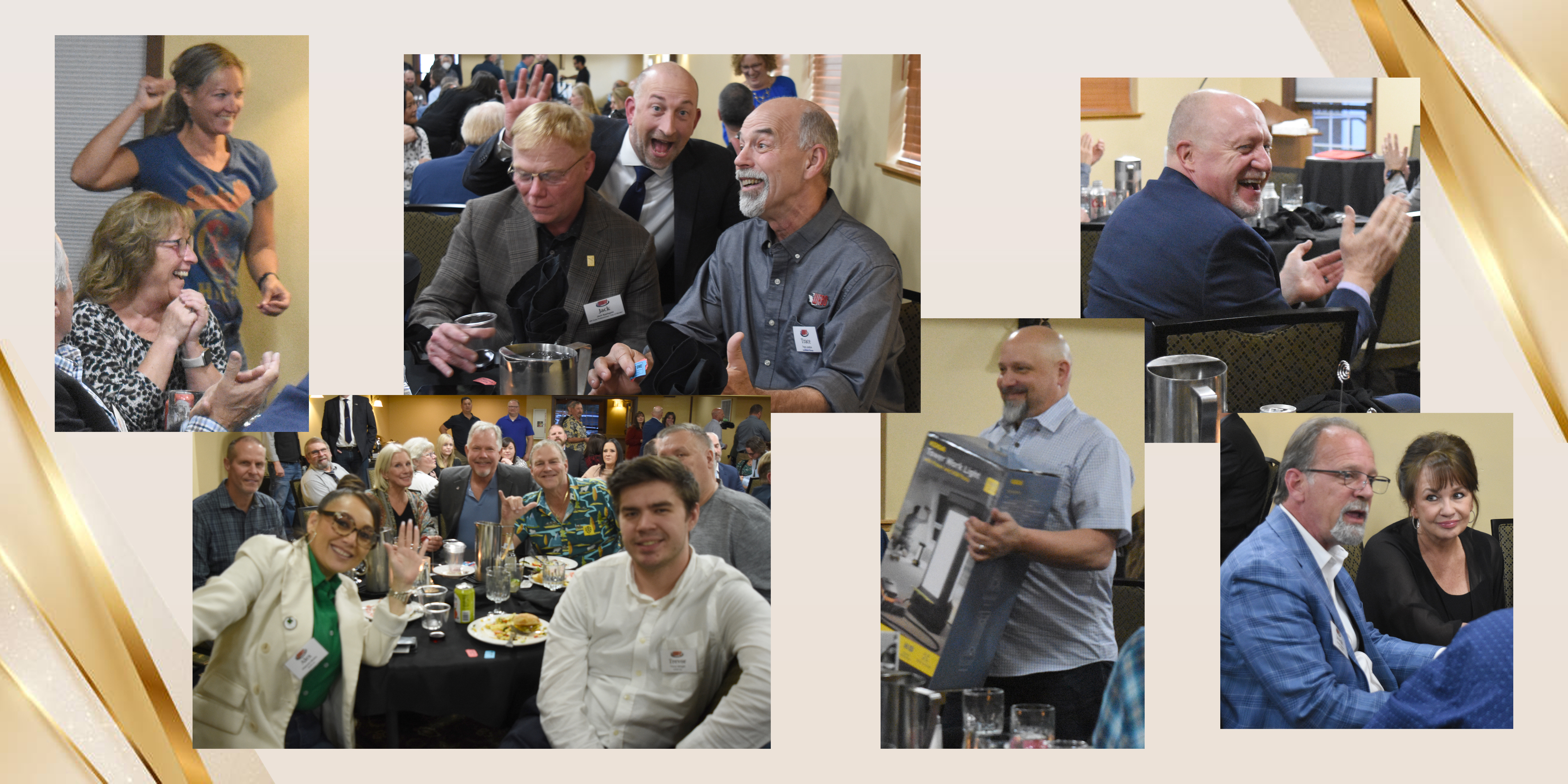
TCD Scholarship Reports on the ICC Committee Action Hearings (Group A1), April 7-16 2024, Orlando, FL:
Quyen Thai - City of Tacoma (TCD Scholarship Report)
Thank you for endorsing me to attend the ICC Committee Action Hearing 1 for the 2027 Group A code proposals in Orlando, Florida this year from April 7th – April 15th. The experience again was extremely invaluable, doubly so with the new format they are attempting for this code cycle.
It was interesting to see how they are breaking the Group A CAH into two parts, I can understand, after having attended the last two CAH to streamline the process further. I’m still not sure how this will play out since I did notice quite a few empty seats, at least in the IFC and IBC-FS track.
A few proposals stood out to me that we would and should look further into it. One in particular was the proposal to require special inspections for Water Resistive Barrier Materials installation to buildings. I know this proposal was made to the IBC, but if passed would not be a far cry to be included in the IRC as well. This would significantly impact the cost and timeline for new construction of any structures including homes.
Another moment that stood out to me, in a good and humorous way, was when Jeff Grove, proponent for E126 Part I came up to the mic, he immediately requested disapproval for his own proposal. After he stepped off, Hoyt Jeter came up to the mic and was more of a proponent for the code change and requested that the committee actually approve it. This, in and of itself, was not the humorous part. What made the entire scenario interesting was that the committee members overwhelmingly agreed with Hoyt and actually approved E126 Part I, 14-0!
I also had the pleasure of assisting Julius with his first ICC Hearing. I am in no way shape or form a veteran at these hearings but I’m always willing to pass on my own experiences with those who have no experience and was happy to see and help someone who is expressing the same interest as I to serve the industry in this manner. So, I did the best I could to provide Julius with my own insight and support, whether in a good or bad way, only time will tell!
Again, I want to express my gratitude to WABO for allowing me to represent WABO TCD in this code hearing process.
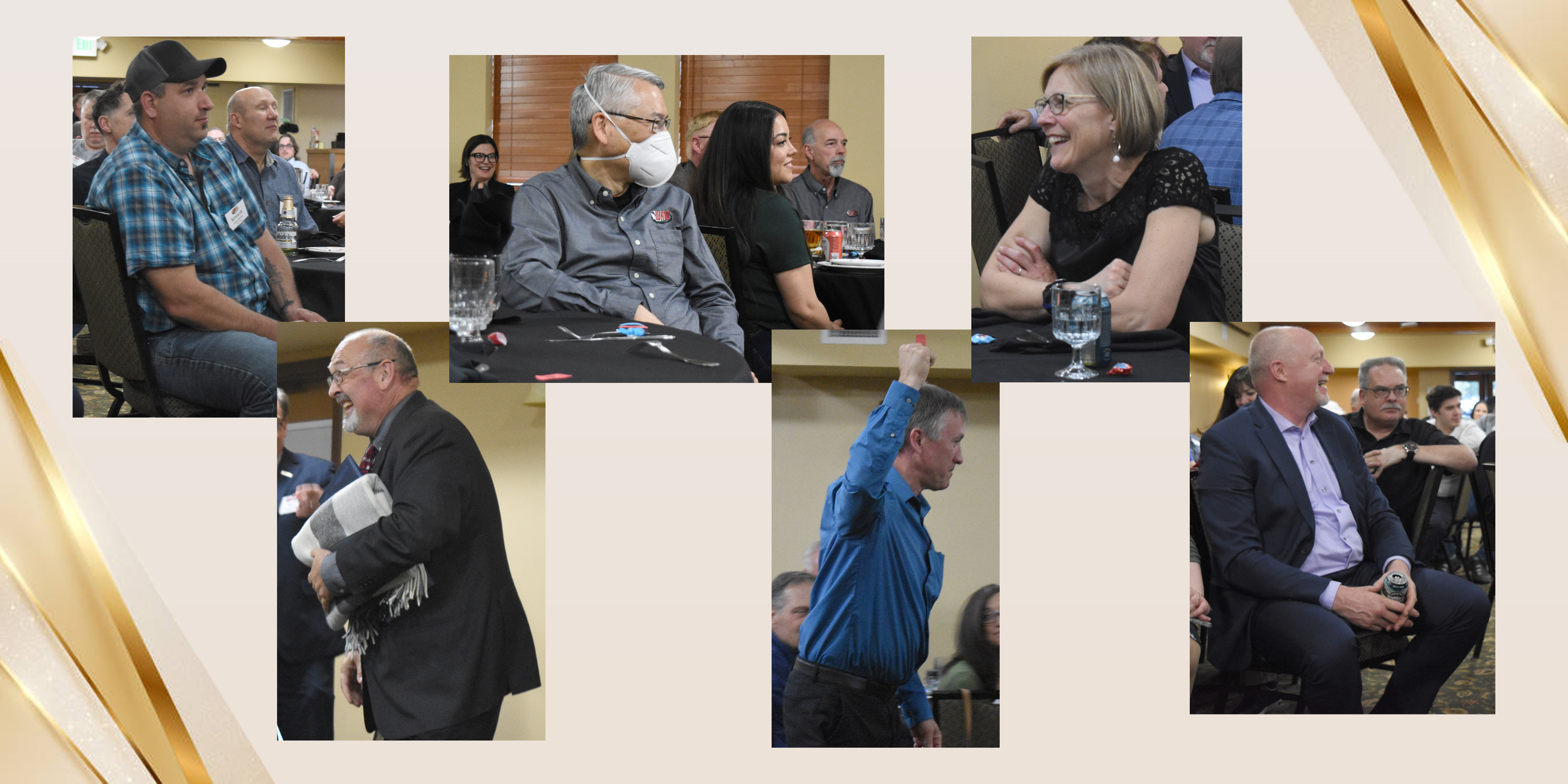
Julius Carreon, SE- City of Bellevue (TCD Scholarship Report)
I'd like to begin by thanking WABO for the opportunity to participate in the 2027 ICC code cycle Group A Committee Action Hearing in Orlando, FL, as a representative of the WABO Technical Code Development Committee (TCD). While I've been involved with the committee's work since 2021, this is my first time attending the code hearing in person. Compared to watching the hearings via webcast, attending in person provides a more in-depth and expansive experience. It also offers the chance to meet and establish new connections with representatives from different organizations.
We have two subcommittees at TCD for the Group A Codes: the IBC-egress subcommittee and the IBC-fire-safety subcommittee. I primarily participated in the fire-safety subcommittee and helped develop two proposals, FS-12 and FS-13, regarding combustible balcony construction requirements in IBC Section 705.2. FS-12 corrects the unintended code change made in the 2018 IBC cycle by renumbering Section 705.2.3.1 to 705.2.4; so the section applies independent of Fire Separation Distance. FS-13 proposal expands on FS-12 to address combustible balconies on new mass timber construction types introduced in the 2021 IBC. Prior to the actual hearing of these proposals, our TCD subcommittee received feedback from American Wood Council (AWC) about their concerns on FS-13. In order to gain their support, we were able to develop a “floor modification” in a short time. I then had the opportunity to testify on behalf of TCD in presenting the proposals and the floor modification in front of the committee. In the end, both proposals were passed by the committee with a unanimous vote, 11:0.
Overall, my experience attending the hearing has been very positive (and successful!). I look forward to continued participation with the TCD at both the State and national level. For those involved in the application of construction codes, I strongly recommend active participation in, or at least attendance at, these code hearings. They offer a unique opportunity to gain a deeper understanding of the code's intent and underlying requirements.
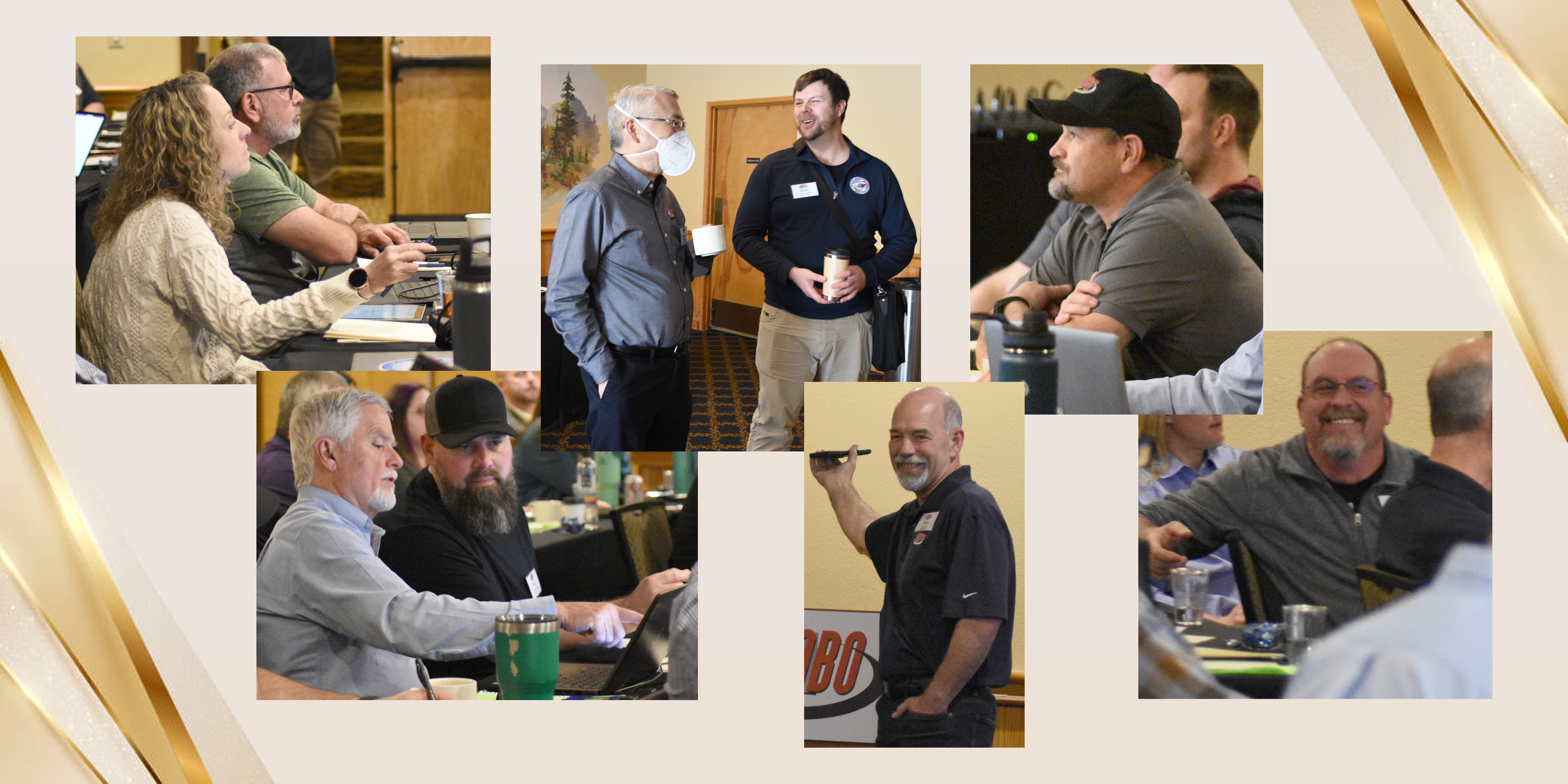
Hoyt D Jeter, PE (TCD Scholarship Report)
Principal Engineer at the City of Tacoma
Lessons Learned from Attending the ICC Code Hearing in Florida
Participating in the International Code Council (ICC) code hearing is not just an event; it's a unique educational journey brimming with insights and opportunities for personal and professional growth. As a recent participant in this significant gathering, I can vouch for its immense value to anyone in the construction and building safety industry. Allow me to share a glimpse of my experience and why I believe it's a must-attend for all.
1. Understanding the ICC Code Hearing:
One of the most enlightening aspects of the ICC code hearing is gaining a comprehensive understanding of the code development process. Witnessing firsthand how proposals are reviewed, debated, and ultimately accepted or rejected provides invaluable insights into the complexities of creating and updating building codes. It's not merely about deciphering technical jargon but about grasping the underlying principles that drive these decisions. Industry representatives, code officials, and interested parties get to testify about why or why not something should be added to the next code cycle. Based on the written proposal and testimony, a committee of experts votes on accepting or denying the code change. .
2. Importance of Collaboration and Advocacy
The ICC code hearing is a vibrant melting pot of perspectives, with stakeholders from diverse backgrounds converging to contribute their insights through testifying for code change proposals. Each participant from around the country, from architects and engineers to builders and manufacturers, code officials, and inspectors, brings a unique viewpoint. This collaborative environment underscores the importance of each individual's role in shaping the future of building codes. It's a platform that champions safety, sustainability, and innovation within the construction industry.
3. Navigating Regulatory Challenges
Navigating the regulatory landscape can be daunting, especially with the ever-evolving nature of building codes and standards. Attending the ICC code hearing equips individuals with the knowledge and tools to navigate these challenges effectively. By staying informed about upcoming code changes and actively participating in decision-making, stakeholders can proactively address regulatory hurdles and ensure compliance with the latest requirements. We learn many times why something is in the code or why not. This make all code user more knowledgeable in our industry.
4. Networking and Professional Development
Beyond its educational value, the ICC code hearing provides an unparalleled opportunity for networking and professional development. Interacting with industry experts, exchanging ideas, and forging connections can pave the way for collaboration on code change proposals. Whether you're a seasoned professional or a newcomer, the relationships forged at these events can prove invaluable.
5. Advocating for Change
Perhaps the most compelling lesson learned from attending the ICC code hearing is the power of advocacy in driving change. Individuals can influence the direction of building regulations and standards by actively participating in the code development process. Whether advocating for or against essential code issues, each voice plays a crucial role in shaping the construction industry. I testified on a proposal that the proponent was discouraged since his other proposals were unsuccessful. My testimony, I believe, helped the committee vote for the approval of his code change.
6. Conclusion
In conclusion, attending the ICC code hearing is not just an educational experience; it's a transformative journey that empowers individuals to contribute meaningfully to advancing building codes and standards. From gaining insights into the code development process to fostering collaboration and advocacy, the lessons learned from these gatherings are invaluable for anyone involved in the construction and building code industry. As I navigate the complexities of an ever-changing regulatory landscape, the knowledge and connections forged at events like the ICC code hearing will undoubtedly serve as guiding beacons for years to come.
C. Ray Allshouse AIA, CBO (TCD Scholarship Report)
I was able to sit through the entire IBC FS hearing providing selected testimony based on TCD discussions at the sub-committee and committee levels. I managed to help support the committee with approval of FS 39, which prevailed by a single vote and provided “me too” support of FS 51. This is evidence that we truly make a difference by being in attendance. Although my support did not prevail on FS 65, I am looking forward to reconsideration in Long Beach. Through testimony, I also provided clarification to the FS Committee in rebuttal to dispel the notion that adding a special inspection requirement in the code should not be rejected merely because no program currently exists. Except where the hearing schedule conflict occurred with IBC FS, I was able to attend the residual IBC E hearings with occasional “me too” testimonial support. In summary, we helped carry on a constructive contribution of WABO TCD to the national code development effort. I continue to support WABO’s financial commitment very strongly to ICC model code development as a superb use of our resources while also expanding individual depth of code knowledge for our volunteer participants. This is a true “win-win” situation.
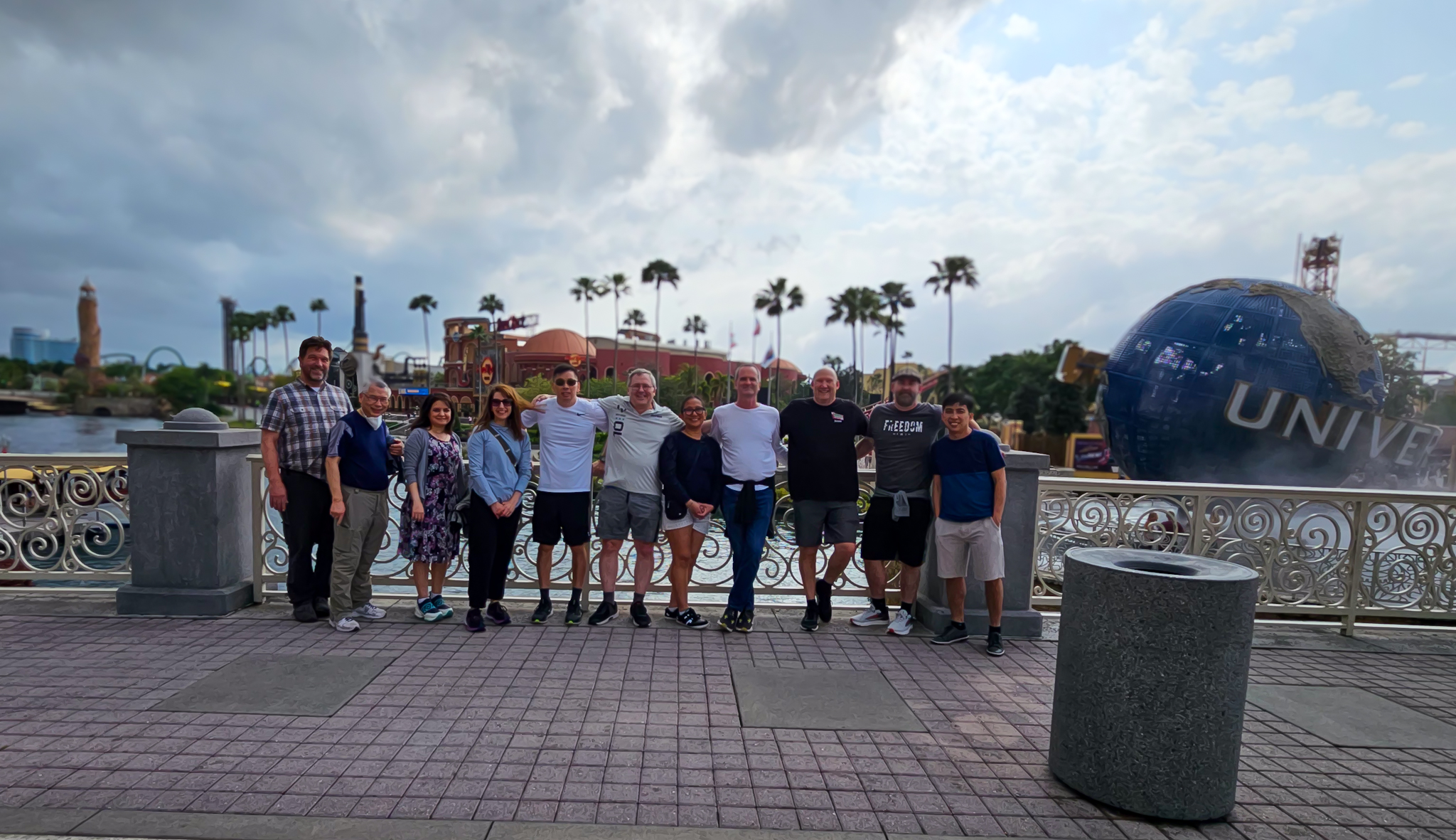
Angela Haupt, CBO
To whom it may concern,
I recently attended the ICC Committee Code hearings in Orlando. I have been participating in the ICC hearings for many years. This year there is a new process for the 2027 code development. This year has two Committee action hearings instead of one. That means that even if a proposal was disapproved by the committee, we can still make adjustments and take a second try if we want.
There were some proposals that the committee is just never going to pass, but we gave it a shot and put it out there. That’s why State amendments are so important. I am the TCD Egress subcommittee chair, so I had proposals that came from my group. We all shared the testimony on them. Some were successful, some weren’t. I also had a non-TCD proposal that Jon Sui and I put forward. It did not get approved, but we made a solid effort.
The next steps are to start with the 2024 code cycle State amendments. After that, this summer we’ll work on public comments for the second round of committee action hearings that will be in Long Beach this fall. Can’t wait to do it all over again.
Angela Haupt
City of Kirkland Plan Review Supervisor
WABO Technical Code Development Committee
Egress Sub-committee Chair
Shane Nilles, CBO, ACO
Just when you think you get a grasp on something they go and change it – in prior cycles the hearings consisted of a single hearing before the committee, and then the public comment hearing. This cycle they added a 2ⁿᵈ committee action hearing meaning that the CAH1 wasn’t the only chance to get committee approval. This created a lot of uncertainty as to how critical testimony would be knowing that there would be a second chance. I suppose as a Building Official I should be used to the rules changing.
While I was not in attendance for the 1ˢᵗ half of the hearings, at least for the 2ⁿᵈ half it was apparent that the urgency to testify at the CAH1 was not as prevalent as the cycles prior as there was a significant lower level of attendance and number of testifiers. This led to the process going much faster which, while welcomed from the stance of not having to go later than scheduled, meant being more prepared for what was coming up. Aside from the change in pace and different sense of urgency, the hearings still carried an environment of the same level of knowledge and experience that surrounded the prior hearings. The proponents and opponents spoke passionately, and the committee kept the crowd on its toes.
The most surprising committee move came from the Egress Committee, but perhaps the surprise is more of a nod to the testimony. The proponent was the Building Code Action Committee (BCAC) as represented by Jeff Grove of the Nevada Chapter. The proposal was intending to be clarification in
nature, to specify where 13D sprinkler systems could be used, a change to one table which was similar to other BCAC proposals that applied to other portions of the code. Those other proposals had consistently and overwhelmingly been disapproved by the committee. Jeff had led the charge on
those other proposals, and exasperatedly he stepped up to the mic to testify on this one last attempt. Submitting to impending defeat he declared to the committee that “We know where this is going and when I signed up to speak for the BCAC on these I should have asked for a blindfold and a
cigarette – we’d just like to ask that the committee disapprove this proposal as well and we’ll work on it for the CAH2”. Laughs rose from the crowd, all knowing that the request for disapproval by the proponent would surely be granted. Enter Hoyt Jeter. Hoyt had testimony prepared to support
the proposal, and in pure Hoyt-fashion, with confidence in the value of speaking what you believe
regardless of the outcome, he proceeded to give his support testimony despite the proponent requesting disapproval. With no other testimony, we waited for the committees unanimous disapproval. Then to the shock of everyone, the motion was made for approval and after brief
discussion the committee voted to pass it! The proponent threw his hands in the air with complete confusion as to how it happened, and Hoyt, with the slightest smirk, walked back to his seat as the crowd laughter reignited into a roar.
So much for having a grasp on what to expect as we learned that the secret to getting your proposal approved is to adamantly request disapproval, or perhaps it’s having Hoyt’s bright blue eyes hypnotize the committee to approve it despite your attempt. At least there’s one thing that’s consistent – you can never predict the hearings or the outcomes. You can also always count on the relationships and experience you gain, and unanticipatedly the opportunities that they may present.
As a Building Official from a small town in Eastern Washington, attending these hearings and working with the WABO Technical Code Development committee has broadened my knowledge and reach far beyond the Cheney city limits. Unconsciously it also led to me sharing my own capabilities to
others in the country whom I otherwise would have never met. Because of that I am thankful to WABO for expanding my opportunities and supporting my development – which, as a result, shortly after the CAH1 hearing I received and accepted an offer to work for the American Wood Council. While this
new position will mean I am no longer a Building Official, I will still be deeply involved in the code development process and have increased opportunity to support WABO and other code officials in the PNW region. I suppose the ICC hearing process isn’t the only thing subject to change.
|